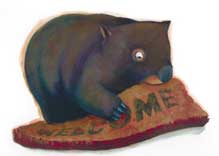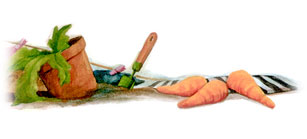Laureate, Day 34 | Latest Books | Pete the Sheep: the Musical
Schedule for 2014 (so far) | The February Garden
A Few Recipes: Fried pizzas and garlic flatbread
Introduction
It’s hot. Just watched a wallaby bathing in our frog pond.
The wombats are also hot. Also annoyed because there’s no lush grass and it’s all my fault. They lurk outside the door, hoping for carrots. Which they get. Who can resist a wombat? Especially when the wombats here these days politely wait outside looking hopeful, instead of bashing the garbage bin, eating the doormat or chewing the front door. Like Mothball used to do.
Except for Wild Whiskers, who hides behind the hop vine and leaps out to bite me as I pass by. She’s Mothball’s daughter. She’s not really nasty, just doesn’t like feeling grateful for carrots. Wombats don’t do grateful. She has been trying to teach her daughter, Small Whiskers, to bite too. But so far she just looks attentive, storing up techniques to use later.
The possum in the ceiling isn’t happy either. He’s been there for years, waking up only if we have visitors during the day, when he growls a bit, then dropping off to sleep again. But last week he was challenged by another possum and every possum in this end of the valley joined in the shrieking. Old Grumpy won, though, and all has been quiet since. Apart from the fruit bat shrieks in the night, when one finds another tree full of fruit to share with the others. And the lyrebirds, half a dozen of whom are lurking in the shrubbery by the house.
And me, practicing a rain dance…
Laureate, Day 34
8.10 Read emails. Answer emails.
8.45 Accept invitation for May 2015.
8.46. Panic. What else might be on in May 2015?
9.05 Accept another invitation for May 2015. Later in May I hope.
9.05 Send Letters to the Editor about Give-a-Book Day.
9.21 Run out of editors’ addresses.
9.22 Ask wonderful Amanda of HarperCollins for more addresses.
9.23 Amanda offers to send letters.
9.24 Rejoice.
9.26 Write to magazines to ask them to include reviews of children’s books.
10.00 Discuss ways to do videos for kids in remote schools with electro-boards and HarperCollins.
10.30 Radio interview
11.00 Plot an award for ‘Best Children’s Librarian’ with Justine to present to the Committee.
12.10 Read and answer emails.
2.10 Draft a blurb for I am Juliet.
2.30 Work on article/blog/chapter on Reading to Babies.
4.25 Quick coffee.
4.30 Interview with Reading Matters.
4.50 Start to answer 32 emails.
5.05 Decide to stop answering emails. Water the tomatoes. Pick the tomatoes. Make tomato sauce for dinner.
6.10 Write this
6.12 Receive another invitation for May 2015. Panic.
6.15 Ask Geri and Justine in the Laureate Office to decide on third invitation for May 2015.
7.05 remember carrots for the wombats.
7.12 Am firmly reminded that it’s dry and more wombats need more carrots.
7.15 Provide carrots
7.16 Put dinner on lap. Put feet up. Thank Bryan for turning on the DVD.
7.17. Ignore wombat. Relax.
Latest Books
Coming soon: A Home for Hairy Nose (with Sue deGennaro)
Refuge
A young man survives a sea journey when his boat is hit by a freak wave and arrives in the Australia he had dreamed of. But his companions in the game on the beach come from many different times and have their own Australias. Together they learn to accept reality – and each other.
Let the Land Speak: how the land created our nation
This is a re-interpretation of Australian history, focusing on how the land itself, as much or more than social and political forces, shaped the major events that led to modern Australia.
Our history is mostly written by those who live, work and research in cities but the land itself has shaped our history far more powerfully and significantly than we realise. Let the Land Speak reinterprets the history we think we all know – from the impact of indigenous women who shaped their nations far more profoundly than firestick farming to the Eureka Stockade and to the role of the great drought of the 1890s in bringing about Federation the land has shaped our past. Let the Land Speak also provides insights into ways we can read the land, predict the future – and survive it.
Down the Road to Gundagai
This is the third in the Matilda saga, following A Waltz for Matilda that began in 1892 and continuing with The Girl from Snowy River set in 1919. Each book can be read separately or as part of the series.
In Down the Road to Gundagai, Blue Lawrence has escaped the prison of her aunts’ mansion to join The Magnifico Family Circus, a travelling troupe that brings glamour and laughter to country towns gripped by the Great Depression. Blue hides her crippled legs and scars behind the sparkle of a mermaid's costume; but she’s not the only member of the circus hiding a dark secret. The unquenchable Madame Zlosky creates as well as foresees futures. The Bearded Lady is a young man with laughing eyes. A headless skeleton dangles in the House of Horrors.
And somewhere a murderer is waiting… to strike again.
The Road to Gundagai is set in 1932, at the height of the Great Depression. Matilda is still running Drinkwater Station, but has put aside her own tragedy to help those suffering in tough economic times and Joey, from The Girl from Snowy River, uses his new medical skills to solve a mystery.
And the wombat is back! When a Wombat Goes to School is simple and hilarious and showcases Bruce Whatley at his wickedest. The scene outside the Principal’s office is priceless. We had enormous fun with it. And I suspect that kids will have even more.
Pete the Sheep: the Musical
This hilarious, woofing and baaing and toe-tapping version of Pete the Sheep is by the glorious Monkey Baa Theatre for Young People. It opens at the Darling Harbour Theatre on 29 March and school performances begin on Monday, 31 March. Teacher’s notes are available too, and there’ll be video-link workshops.
Bruce and Rosie Whatley and Bryan and I will be at the first two performances. You might just also get to meet a bloke called Pete…
As composer Jonathon Biggins says, ‘Ewes will love it.’
The February Garden
It’s dry. So dry I’m trying not to think ‘garden’ till it cools down again, or rains, which ever comes first. (I’m not hopeful about the rain.) Our only garden activity is:
. Scattering hoarded pre-used water on anything that is truly threatening to turn up its toes. A bit of wilting or browning of lush growth doesn’t count.
. Picking tomatoes. And more tomatoes. And more and more and more…
. Forgiving the possums and fruit bats for eating all my melons. Almost.
. Scattering carrots liberally for the wombats – wombats don’t do grateful, but given the general dryness…
. Scavenging a few apples that the fruit bats have left us.
. Making peach and grapefuit jam for the Childrens’ Book Council of Australia conference visit down here in May – it’ll be served with sweet potato scones and soups, and whatever vegetables-are-in-the-garden slice. And bickies. And possibly apple cake. I blame Grandma’s genes – I always over-cater.
If by some chance the rain dance works, I’ll be planting cabbages, broccoli, winter lettuce, more silver beet, spinach, and other winter goodies, and masses of sweet peas for a fragrant spring. If it doesn’t rain, I’ll keep bucketing to the asparagus.
Schedule for 2014
There are several more tentative bookings to be added, but this is what’s been confirmed so far. If I can’t get to your school or preschool, then a video conference may be possible, arranged through HarperCollins, Jacqui.Barton@harpercollins.com.au.
You can also download videos of talks about various books or workshop ideas from the excellent HarperCollins’ Teachers’ Hub. Go to www.harpercollins.com.au and click on Teacher’s Hub (there are also excellent teacher’s notes for most of my books) or contact Jacqui Barton, Education Manager, HarperCollins at the email address above.
Invitations to speak should be sent to the Laureate Office, or check the Laureate web-site, www.childrenslaureate.org.au, for schedule updates. If I’m in your area then I’ll try to fit in any other invitations.
28 February – Video talks. Contact Jacqui Barton at HarperCollins.
Saturday, 1 March – State Library NSW: Conference.
Sunday, 23 March – talks at the Wheeler Centre, Melbourne.
Tuesday, 25 March – morning story time for pre-schoolers, WA State Library. Afternoon talk for parents, teachers and librarians.
26-28 March – Storylines Festival, All Saints School, Perth. Public evening session on the evening of 26 March.
31 March – first performance of Pete the Sheep: the Musical, by the wonderful Monkey Baa Theatre for Young People, Lend Lease Theatre, Darling Harbour, Sydney. Pete will tour Australia through 2014. Contact Monkey Baa for performance details, or if you’d like me to do an email chat with your class before or after the performance.
4 April, 12.30 – Talk at the Sydney Jewish Museum
8 April, 10.30 – Dance to Dinosaurs Love Cheese Braidwood Library.
8 April, 12.15 – Dance to Dinosaurs Love Cheese Bungendore Library.
May 6-8 – Adelaide, talks to schools
9 May – MANTLE conference (annual professional conference for teacher librarians in the Maitland, Newcastle, Taree, Lake Macquarie and Central Coast districts), Newcastle.
11 May – Araluen, Open Garden Day: contact Open Garden Scheme.
17-18 May – National Children’s Book Council of Australia (CBCA) conference, Canberra.
19 May – CBCA visit to our property.
21 May – National Story Time at the National Library, Canberra.
23 May, 2 pm – History Council of Australia panel at the Sydney Word Festival.
24 May – Colin Simpson Memorial Lecture, Australian Society of Authors, Melbourne
9-12 July – ALIA conference, Darwin, and other talks in the Northern Territory. 8-10 August – Bendigo Literary Festival, Bendigo.
23-26 August – Sessions at the Melbourne Writer’s Festival.
27 & 28 August – Christchurch Writer’s Festival, New Zealand.
29 August- 2 September – Storylines Festival, Auckland and Wellington, New Zealand.
22 October – Launch Children’s Day, ACT.
28-30 October – Conference, Southport, QLD
8-9 November – Araluen Open Garden Days. Contact the Open Garden Scheme.
14-22 November – Port Hedland, WA.
A Few Recipes
Fried Pizza
Home baked pizzas are always slightly heavy or soggy unless you have a backyard wood-fired oven – ordinary home ovens don’t get hot enough for superlative pizza. This methods gives delectable results. The dough needs a couple of hours to rise, but if you mix it overnight or in the morning you can have superlative pizza within 15 minutes – faster than any dial-a-pizza can be delivered.
Pizza dough:
6 cups four
1 sachet or 3 tsp dried or fresh yeast
1 cup warm water
1 teaspoon sugar
1 pinch of salt.
Place sugar, salt and yeast in the water. Leave overnight or till it’s bubbling. Dried yeast is often mostly dead yeast, and using too much gives a yeasty flavor. This way you breed fresh yeast, and you don’t need so much of it.
Mix liquid with flour. Add more if necessary to get the flour to bind into one dryish mass. Now knead, thump and pull and generally punish it. The more you pummel it, the more gluten will be released and the better the dough will be. Bash it around for at least twenty minutes.
Take ping-pong ball sized pieces of dough. Flatten them with your hands or roll them out. They should be round and thin. Leave on baking paper for at least an hour, overnight or all day to rise.
Prepare the toppings then cook the bases.
To cook the bases:
Pre-heat the oven to full.
Heat a fry pan for three minutes. Add a very little olive oil and swish it around. Lower the heat to medium. Fry the pizza bases on one side till brown, then the other.
Remove, line them up, and put on the topping.
Place them in the top of the oven for about five minutes for the toppings to cook and the whole to amalgamate.
Eat at once, hot.
Three Cheeses Pizza
½ cup grated mozzarella, 1 tbsp parmesan, freshly grated, ¼ cup feta, in tiny chunks. Mix, scatter and bake.
Potato Pizza (supremely delicious)
4 boiled potatoes, skinned and cubed
1 cup grated mozzarella cheese
4 tbsp chopped chives or spring onion tops
Mix. Scatter. Bake.
Cherry Tomato Pizza
4 cups cherry tomatoes, each slit with an x across the top so it opens on cooking
2 cups mozzarella, grated
4 tbsp basil leaves, rubbed with olive oil
Scatter on cheese; arrange the cherry tomatoes. Bake for six minutes. Take them out, scatter on the basil and bake for another two minutes. Serve hot.
Griddle breads
These are the pizzas without the toppings: also incredibly good.
Basic griddle bread: cook as above scatter on rock salt (and rosemary if you like it), serve hot.
Garlic and onion griddle bread:
Sauté 6 cloves chopped garlic and 1 chopped red onion in olive oil till soft. Add 1 tbsp chopped chives and add to the dough before you roll it out. Cook as above.
Chilli griddle bread
Add 4 finely chopped red chillies to the mix. Wash hands well after chopping. Cook as above.
Buttery Griddle Bread
Spread the rolled-out griddle bread with butter. Fold in half, roll out again, then spread with more butter. Roll out once more and leave to rise and cook as above. Result is rich and flaky – sort of like the child of pizza and roti.
Sweet Peach or Apricot Griddle Bread
6 chopped dried peaches or 12 chopped dried apricots, soaked in water overnight
Add this to the dough before you follow the procedure above for buttery griddle bread.
Chopped apples are good too. Dip in lemon juice to stop them browning and a sprinkle of cinnamon and sugar before adding them to the dough.
|


